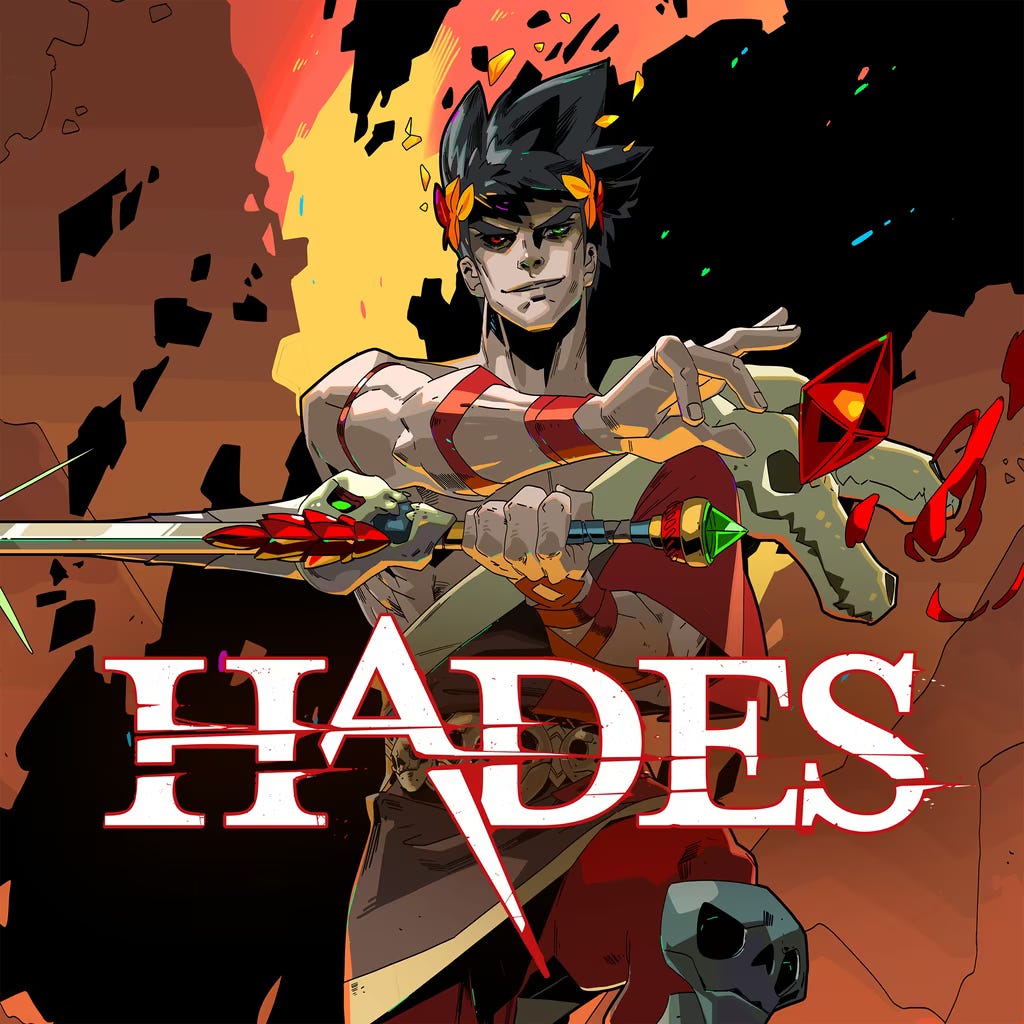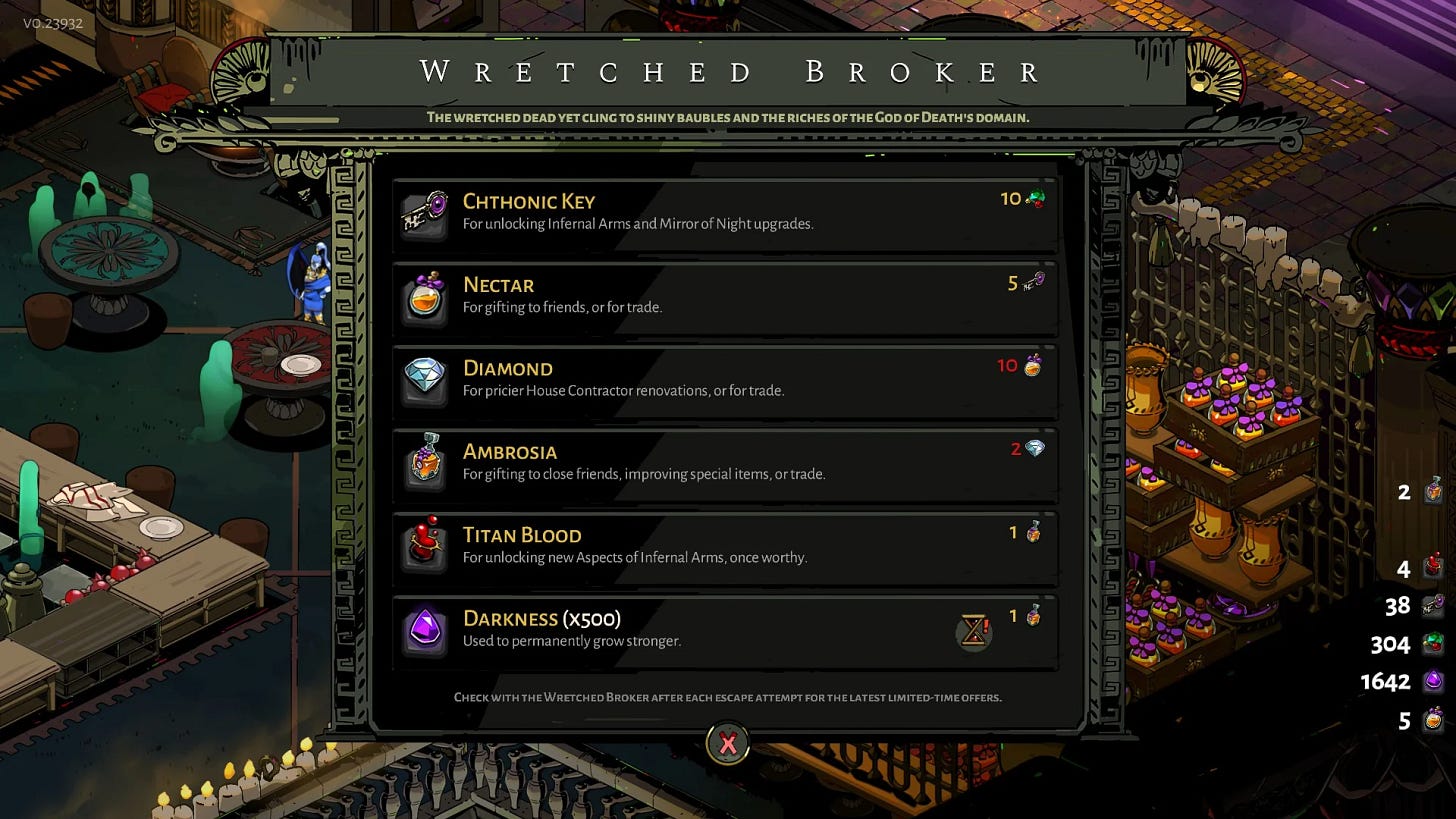Some Scattered Thoughts About Hades
You want your game to burn players out on a nice design idea FIRST.

I finally got around to playing Hades, the megahit roguelike from Supergiant Games. It did well enough over long enough to get a sequel, but I'm still writing about the old original one. It takes me a long time to build up the energy to pour in the number of hours a game like this requires.
It's a 2020-vintage roguelike, which means: A bunch of rooms with fights. You get money to buy randomly selected upgrades. There's a few bosses. Eventually you win or lose. Either way, you get currency in your run to buy that sweet, sweet meta-progression.
I liked it a lot, to a point.
A spent 35 hours getting to the credits. (Getting the Good Ending (tm) takes FOREVER.) I've won with 5 out of 6 weapons. (All but the sword, which seems intentionally terrible.)

I'm getting over a flu and can't work up the energy to write a proper article with paragraphs and stuff, so I'll experiment with a quicker, looser format. Happily, since this game has made mountains of cash, I can be honest about things.
1. Three elements dovetail perfectly to make this game work as well as it does. The combat is smooth, fast-paced, and enjoyable. Supergiant Games combat has always bounced off me, even going back to Bastion, but this game works.
2. Second, Hades works your dopamine receptors with brutal ruthlessness. There is, what, seven meta-progression currencies? Plus system after system for improvement. If I finish the game, there will still be all sorts of weapons and abilities I'd have to put in a bunch more time to unlock.
Seriously, study this game. The pace at which it drips out stuff is perfect. The impact of the choices and the amount of choices given are also perfect.
(Of course, any hit indie game in this decade gets heavily studied and mercilessly copied. )
3. Third, it is constantly feeding you snippets of interesting story, at least early on. For the thousandth time, writing good story is free, and it can do incredible amounts to make people more engaged in the game.
You are constantly having tiny conversations with the characters to learn about your story and the world. When Hades introduces you to its versions of the Greek gods and leads you through the initial secrets of the story, it does wonders to push you through the early inevitable defeats.

4. However, there is only so much you can do with snippets of stories. Early on, I never sped past the conversations. At some point, however, the story became listening to pairs of people hack their way through fairly uninteresting conversations at the rate of 3 lines per 90 minutes.
Storytelling like this is a great way to juice your game with some nice texture, but know its limits.
5. It tends to be really painful when modern game designers take on stories from ages past. When you read, say, Shakespeare or the ancient Greeks it gives you a chance to get messages straight from the past which reads like a lost, alien culture.
If you take this as a chance to learn about the breadth of human experience and what of it is universal, this can be a marvelous experience. When you take it as a chance to act morally superior and pretend you are a better person and then "fix" the past to flatter yourself? Less so.
Hades actually does a pretty good job with this for the most part. The key is the tone. There is a nice vibe of casual, eternal violence and arbitrary maliciousness. The cheerful, mercurial maliciousness of the Gods feels true to the source.
I feel no need to pick nits. The writers were wise enough to know that the source material they had to play with includes some of the most timeless, evocative stories in all of human creation.
(Maybe Hades 3 can be Norse. Could make up for God of War making an utter hash of it.)
6. Hades indeed has an enormous amount of content. This game was built to eat a thousand hours. I really admire the confidence of the developers. There was so much indie game competition, and yet they felt they could make a game to beat all the others out for huge chunks of your limited time.
And you can't argue with their success. This game has a huge and dedicated community who plays it a LOT. You have to respect when a design does that.
7. This next part is more about me. It's NOT a criticism. Even if it was, Supergiant wouldn't be able to hear it inside their giant fortress made of money.
By the time I was near the end of the game, I stopped having fun. In fact, some sort of switch flipped. The thought of playing it made me depressed and angry. When I ended a session, I felt queasy.
It was weird. I've never reacted to a game like this before. I mean, I finished, so I must have been having "fun." And yet, I had this visceral, physical negative reaction.
I'm an edge case. Remember, I've been playing video games made for public consumption about as long as they have existed. So I'm a pioneer. My brain has marinated in these things as long as temporally possible. My brain should be studied. Scanned. Sliced thin. Perhaps, compare it to the brain of someone born in 1950 and to figure out where humanity went wrong.
I'm much more likely to get annoyed at a game than I used to. When I watch streamers try Steam Next Fest demos and it's all mashups of Slay the Spire/Vampire Survivors/Gain a Level and Pick One of Exactly Three Upgrades games, all I can do is sigh and look away.
Hades is really good, but it's still a perfectly-implemented mix-and-match of a bunch of prior successful games, and I think at some point the novelty of Hades wore off and all the other stuff I'm just tired of came crashing down on me.
(EDIT: It has been correctly pointed out that I am being unfair here. Hades had its official release in 2020, and some of its design elements were fresh and innovative at the time. It’s only exhausting to me now because their innovations became standard. A new idea can only be new once, but that’s not Supergiant’s fault.)
This is why, when I learn about an indie business going under, or a set of layoffs, I never even pretend to be surprised. Making a new idea is HARD. A new idea that's actually fun is even more rare. We have this limited menu of ingredients, and we keep looking for new ways to mix and match them, but in the end it all feels the same.
(To be clear: When someone actually does come up with a fresh video game idea, I'm first in line. I'm ecstatic. I really do love our young, eccentric artform.)
Anyway, I truly wish Supergiant the best of luck with Hades 2. It's selling great. I hope it sells a lot more and makes people truly happy. My ability to appreciate Hades 2 should have regrown by around 2034 or so.
Spiderweb Software creates turn-based, indie, old-school fantasy role-playing games. They are low-budget, but they’re full of good story and fun. You can still late-back the Kickstarter for our next game, Avernum 4: Greed and Glory.


As you say, there are a limited number of elements. Me, I play a VERY limited subset of video games--Spiderweb and Aldorlea are my personal Big Two developers. Both excel at world building in a series game, and I want to wander around and discover new things and monsters and places and peoples, and oh, yeah, fight and learn the spells. Give me a world like Avernum or the Laxius force world and an 'Easy' or 'Story' level to play at first time through, and I'm happy as a hog in clover. I'll learn enough about the combat and leveling and gear systems so that I don't have to use cheats, or only rarely, and I'll happily explore until I see the world in my dreams, following up every side quest I can find. Then, on the second run through, I'll pay attention to battles. And ignore the game for a year or 18 months, and discover its world all over again.
I had to stop and think about "It's a 2020-vintage roguelike" -- both because the timeline surprised me and because Hades feels like one of the roots of that vintage, rather than a fruit of it.
The Early Access window is part of what confuses me -- I was playing Hades by 2018, in those unimaginably distant pre-Covid years. So very long ago.
But regardless of whether measured by the date of EA launch or full release, Hades was only a year behind Slay the Spire. And while it definitely wasn't the first roguelike to have most of the mechanics on display (nothing is new under the sun -- my most personally-beloved Edward Gorey-styled roguelike Our Darker Purpose had players picking one of three random perks on level-up back in 2014, and it wasn't the first either), I honestly don't think those systems were particularly tired or played out at the time? To where I'm not sure how fair it is to call Hades "a mix-and-match of a bunch of prior successful games", because that's getting into some awfully sweeping generalizations.
None of the big roguelikes released in 2018 or 2019 *felt* like Hades much in structure or gameplay -- I'm thinking of Dicey Dungeons, Risk of Rain 2, Noita, Void Bastards. The 2020 roguelike explosion had a couple games that did feel quite similar (Dreamscaper, Curse of the Dead Gods), but they felt like pale shadows of Hades's light. Other roguelikes in that 2020 boom felt like very different animals -- Spelunky 2, Rogue Legacy 2, Star Renegades, BPM, One Step from Eden, Monster Train, and Ring of Pain don't seem like the same structure as Hades to me, though that's a matter of degree and perspective.
There are certainly plenty of imitators *now*, of course -- I feel like there are even more Hades clones washing up on the shores of Steam than there are deckbuilders in Slay the Spire's vein. There's a Teenage Mutant Ninja Turtles Hades-like at this point.